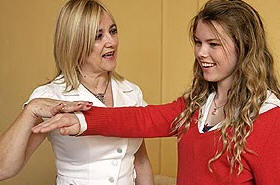Fun Stuff for Rapid Change!
Life Coaching & Alternative/Holistic Counseling Magical Toolbox
Using Signals to "Talk" with the Unconscious Mind
Ideomotor Signaling
Ideomotor
signaling is when a deeper level of the unconscious mind "signals" to the
conscious mind its understanding of a question
using any one of a variety of agreed upon responses. I call this part of
the unconscious mind the body wisdom.
This is the part that "knows" more than we do. Does the conscious
part of you, know how to heal
a cut ... keep your heart beating ... or know what food is good for your
personal body health ... or what vitamins your body needs ... among
thousands of other things?
Sometimes it is useful to access this deeper part of ourselves to learn
more about our inner knowledge on some topic or issue, or to negotiate
with it to protect us or take better care of us.
There are
several ways to open up this channel of communication.
One is
through finger movements. Signals are generally set up to indicate
"yes" and "no" answers and sometimes "I’m not ready to know the answer
consciously yet," response.
These replies
may be established consciously by the client and Life Coach & Alternative/Holistic Counselor, or they may be
chosen by the client’s unconscious mind. This depends on the work in
progress along with the client’s preferences.
 Using a
pendulum
over the body or held over a chart is another way to get internal answers.
The pendulum has been around for centuries and is used in divination,
dowsing, chakra testing, and clearing as well as using it as a simple form
of communication with the unconscious mind. Once again, signals are set up
to indicate appropriate responses.
Using a
pendulum
over the body or held over a chart is another way to get internal answers.
The pendulum has been around for centuries and is used in divination,
dowsing, chakra testing, and clearing as well as using it as a simple form
of communication with the unconscious mind. Once again, signals are set up
to indicate appropriate responses.
The
Cameron
Aurameter is a wand-like tool that utilizes our inner knowledge to provide us with
much sought after knowledge. The Aurameter can be used for detecting
subtle energies coursing through your body, which will hopefully make
contact with the object of your search, through the medium of known laws
of sympathetic attraction.
sought after knowledge. The Aurameter can be used for detecting
subtle energies coursing through your body, which will hopefully make
contact with the object of your search, through the medium of known laws
of sympathetic attraction.
Some uses of the Cameron Aurameter include measuring the depth of auras
and indicating the presence of unseen
blocked
energy. It can be used for dowsing for everything from water to oil, to
finding missing persons or objects.
The present
prototype (1952) was developed based on Verne Cameron’s invention in 1930.
Then there is
Applied
Kinesiology, which became known as a result
of the
 work of John Thie, DC through his Touch for Health
training. This is an easy method of testing muscle strength.
work of John Thie, DC through his Touch for Health
training. This is an easy method of testing muscle strength.
This procedure is based on the theory that if you are using or doing
something that is good for you; your muscles will be stronger.
Alternately, if you are using or doing something that is bad for you, your
muscles will be weaker. Your muscles operate as your own biofeedback
equipment.
There is a belief among many users of this system that the innate
intelligence that runs the body is connected to universal intelligence
that runs the world, and that each person is plugged into the universal
intelligence through the nervous system.
All of the above described ideomotor signaling responses come directly
from the deeper part of the unconscious mind.
There are spontaneous and
involuntary reactions. Often forgotten memories, or even memories that
have never been conscious such as pre-birth memories, can be retrieved.
There are seven
keys or seven factors involved in causing any set of symptoms, according to
David
Cheek, MD, the first person to bring
medical hypnosis to the medical community, and developer of the use of
ideomotor signaling.
Through using a pendulum or other
ideomotor
signaling response, along with a specific
list of questions, it is possible to identify the cause or causes for any
particular problem by working through all seven keys.
This involves
setting up a means of rapid and direct communication with the unconscious
part of the mind. In response it replies to questions by
means of unconsciously controlled signals.
The keys are
motivation, self-punishment (formerly called masochism), identification, imprinting, conflict,
body part language (formerly called organ
language), and
past experiences. Once the
relevant keys have been pinpointed, it is then a simple matter of using
the
ideomotor signaling system to achieve a quick release of the problem
that has been
blocked
and causing distress.
When there is a
major inner conflict or a resistance to internal agreement, then the Six-Step Reframe is a valuable option.
It is performed
with
guided imagery while enjoying a relaxed state of body and mind.
This state encourages the opening
of that channel of communication with your
unconscious mind, which is
established through ideomotor signaling.
Ideomotor signaling is any
spontaneous mental picture, involuntary sound or physical movement such as a muscle
twitching, a sudden change in breathing, a feeling of unexpected tension
somewhere in the body, etc. This is produced by the unconscious part of
the mind as a way of establishing "yes" and "no" signals.
The unconscious
part of you that is creating opposition is assumed to have a positive
intention for your welfare.
By separating the behavior
from the intention, you are then able to direct the part that has been
causing an unwanted reaction to go to the creative part–the part of you
that does creative problem solving–and explain, at the unconscious level
what it is trying to do FOR you.
The creative part then generates a
zillion ways to get that outcome; several ways are then chosen by the
unconscious part that are superior to what it had been doing and ways that
are agreeable to all parts of you.
superior to what it had been doing and ways that
are agreeable to all parts of you.
This technique was developed by
Richard
Bandler and
John
Grinder, PhD,
co-developers of
Neuro-Linguistic Programming (NLP).
I sometimes
playfully refer to this technique as
"Give it the Finger." This
surprising little self-help mini-exercise will help you to negotiate,
within yourself, a change of attitude or behavior.
It is a
condensed version of the Six-Step Reframe and created by Renée Pfalzgraf,
an NLP pioneer and Master Ericksonian Hypnotherapist. It will resolve inner conflicts between what you want consciously and what
your unconscious mind is compelling you to do.
This technique recognizes that the unconscious part of ourselves that
is causing the unwanted action or reaction has a positive intention on our
behalf such as some form of protection or care–even if we don’t
like the way it is going about it.
The outcome is
accomplished by holding your index or pointer finger, or any other finger,
or even your arm, in an elevated
position while repeating a specific phrase aloud to yourself.
In only a matter
of minutes, or less, the desired change takes place at the unconscious
level of your mind, allowing your finger to come back down. You can now go
about your daily tasks with the complete support of this inner part of
your mind.
†
Instructions for this simple process can be found on this
website by
clicking or tapping on the following link:
One-Step
Reframe
(aka "Give it the Finger").
Go to next:
Guided Imagery and
Visualization
Top
●
According to the National Institute of Mental Health,
psychotherapy only has a 20% success rate.
●
I have a 97% success rate, and over 37+ years experience.
● THIS
IS AN ALL INCLUSIVE WELCOMING PRACTICE
I honor
and respect your race, religion, culture, sexual
orientation and way of life including senior citizens
and those with disabilities.
I also
welcome adults in consensual, sane and safe, alternative
sexual and other creative lifestyle choices including
those in the LGBTQ+ community.

Confirm appointment location with Dr. Ruth prior to
first meeting.
OLD ADDRESS
4295 Gesner St.
San Diego CA 92117